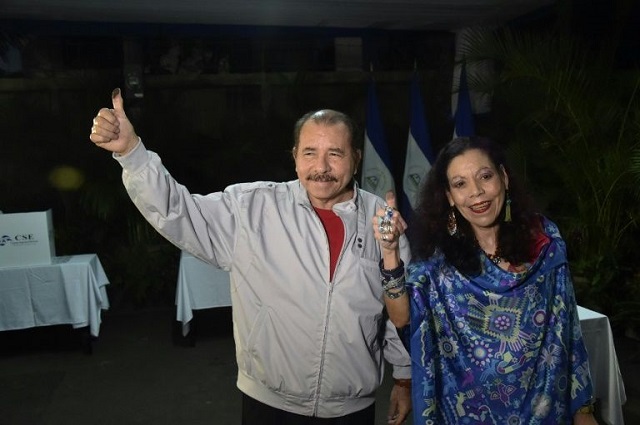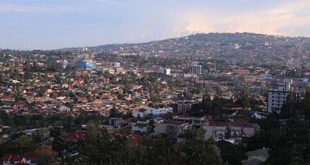
Nicaragua’s shrewd power couple
Managua, Nicaragua | AFP |
Nicaragua’s first couple, President Daniel Ortega and his wife Rosario Murillo, breezed through elections on Sunday that have extended their rule over one of the poorest countries in the Americas.
Ortega, a former rebel who first took power after a Marxist revolution in the 1970s and returned as head of state since 2007, is known as “el comandante” (the commander) for his strong-fisted rule that has cleared away any serious rivals.
Murillo, extravagant, with a penchant for poetry and art, is no less redoubtable in her current role as the government’s chief spokeswoman and — many believe — the eminence grise behind her husband.
Known as “Companera Rosario” (Comrade Rosario), she is now elevated to the post of vice president.
The couple won 72.5 percent of the vote, according to official results with 99.8 percent of ballots counted.
Ortega: reclusive, Machiavellian
Ortega, who turns 71 on November 11, first seized control after his Sandinista guerrillas ousted the Somoza dynasty that had held power over Nicaragua with increasing autocracy from the 1930s to 1979.
Now, his critics accuse him of wanting to again turn Nicaraguan politics into a family affair.
After his rebels triumphed in the country’s bloody revolution, Ortega headed up the leftwing Sandinista government with the support of Cuba and the Soviet Union, and was elected president in 1985.
But, with the economy in ruins, Ortega lost re-election in 1990.
With his Sandinista National Liberation Front (FSLN) party in opposition, he spent the following 17 years “ruling from below” — fomenting violent protests and negotiating reforms with the government — while losing his next two re-election bids.
In the 2006 elections, he finally managed his comeback, benefiting from the death of a popular rival, former Managua mayor Herty Lewites, just months before the polls.
Back in the presidential palace, Ortega maneuvered to gradually take control over all state bodies, the police and the army and to sideline potential opponents.
Backed by the deep oil funds of Venezuela, under his ideological ally Hugo Chavez, he started social programs for the poor, who now continue to support him in droves. But he was also careful to nurture ties with the country’s powerful business families, holding out promises of stability.
A controversial court decision allowed him to stand for re-election in 2011, despite a one-term limit. And three years later his party in congress engineered a constitutional amendment to permit unlimited presidential terms.
Ortega’s shrewd, Machiavellian view of politics, combined with his skill in forging alliances and ruthlessly cornering opponents, made him the leader of the FSLN, which he joined in 1963.
Born in the mining village of La Libertad, Ortega had five siblings, just one of whom — Humberto — is still alive.
Ditching his law studies to join the FSLN, he spent seven years behind bars, at times tortured, at the hands of the Somoza regime.
Some describe him as pragmatic, cold and untrustworthy, while others see him as empathetic and humble.
Now ruling from a heavily guarded Managua residence, he lives a semi-reclusive life. He is driven around in a luxury Mercedes-Benz and lives largely separate from ordinary Nicaraguans.
He is reluctant to travel, or to give interviews or media conferences, and considers those who question his orders to be traitors.
Murillo: Nicaragua’s Thatcher?
While Ortega has cut back on his public appearances in the past couple of years, his “loyal companion” and wife, Rosario Murillo, with whom he has nine children, two of them adopted, has taken the limelight.
“She is a very intelligent, original woman who has a commanding voice” and who has carved out her own space in the political sphere, Eden Pastora, another ex-rebel, told AFP.
He compared Murillo to former British prime minister Margaret Thatcher, who was known as “the Iron Lady,” and Indira Gandhi, an equally willful former prime minister of India.
A ceaseless worker, a poet who speaks fluent English and French, and given to wearing colorful clothes and jewelry reminiscent of the hippie 1960s, Murillo, 65, has long acted well outside the confines of a traditional first lady.
She is the government’s communicator-in-chief, crafting its messages to the people and setting the official agenda, and is a ministerial-level government manager, making sure no one says or acts without her permission.
“We live in a time of blessings, prosperity and victories. Daniel salutes you, embraces you,” she constantly says in daily messages delivered only to state media.
In her broadcasts, given in a soothing tone, she expounds upon the works of the “good government” and reads poems.
She also prominently coordinates emergency responses during natural disasters, for instance during earthquakes in her seismically volatile country.
And she has imposed her eccentric taste on the capital by ordering the erection of several tall metal “trees of life” painted different colors and lit up at night.
Gioconda Belli, a writer who was with Murillo when both were in the FSLN’s guerrilla ranks, but who now opposes the government, said Murillo is superstitious and complex.
In 1977, when she was a revolutionary fighting the Somoza dictatorship, Murillo met Ortega and they soon started a relationship. They married officially 11 years ago.
When Murillo’s daughter from a previous marriage, Zoilamerica Narvaez, in 1998 accused Ortega of having sexually abused her since age 11, Murillo sided with her man to deny the allegation. The charges were eventually rejected by a Sandinista judge.
Today, Zoilamerica lives in neighboring Costa Rica, where she speaks disparagingly of her mother, whom she says chose power over their relationship.
Belli said both Ortega and Murillo are “Machiavellian in the sense that the end justifies the means.”
Even so, the majority of voters in Sunday’s polls backed the first couple in their bid to bolster their rule. The opposition rejected the vote as a farce.
 The Independent Uganda: You get the Truth we Pay the Price
The Independent Uganda: You get the Truth we Pay the Price


